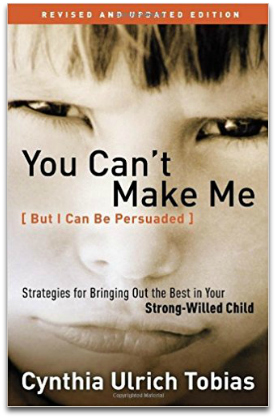 You were hoping to get through this simple errand without any misbehavior from your strong-willed child, but—as usual—here you are again, in a public situation with a child who isn’t quite meeting your expectations for public behavior.
You were hoping to get through this simple errand without any misbehavior from your strong-willed child, but—as usual—here you are again, in a public situation with a child who isn’t quite meeting your expectations for public behavior.
Now what?
From your experience, every time you try to correct your child’s behavior, it turns into an epic power struggle and you tend to find yourself on the losing end most of the time. And that’s the last thing you want right now, with all of these judgmental onlookers watching your every move.
When faced with the unique challenge of raising a strong-willed child, you may find yourself wondering what on earth you can even say to your child to help achieve your goal of improving that behavior, without turning the conversation into a seemingly never-ending battle of wills, with no real solution in sight.
You may frequently wonder: Why does a simple request such as, “Please stop that,” have to turn into such a battle? Can’t he just do what I’ve asked of him, like a child is supposed to do?
The Origin of Strong-Willed Children
For one reason or another—maybe it’s your genetics, maybe it’s your spouse’s, or maybe you just won the strong-willed child lottery—your child was born with the innate ability to argue and negotiate almost every piece of information that is presented to him (which oftentimes looks like disrespect or misbehavior).
This is not your fault. You did not cause your child to develop this personality through some deficit in your parenting abilities—despite the fact that plenty of people have probably made suggestions (or should I say accusations) to the contrary.
 According to one of my favorite books on the topic of strong-willed children, You Can’t Make Me (But I Can Be Persuaded), your child was pre-wired to be strong-willed, just as she was pre-wired to have brown hair, green eyes, and that cute little smile that melts your heart—no matter how many arguments you have with her.
According to one of my favorite books on the topic of strong-willed children, You Can’t Make Me (But I Can Be Persuaded), your child was pre-wired to be strong-willed, just as she was pre-wired to have brown hair, green eyes, and that cute little smile that melts your heart—no matter how many arguments you have with her.
Your child—just like you—has her own way of looking at and learning from the world. Just like you, she does fine when allowed to view the world and respond to it in her own way. But when she is asked to look at the situation differently, in a way that doesn’t fit with her pre-wiring, she has a difficult time with this, and you start to notice misbehavior and power struggles.
Why Does the SWC Personality Bother Us So Much?
 Our first instinct as adults is to say something like, “But she has to learn… she can’t always be in control!” We want to expect the child to change her pre-wiring because it doesn’t fit with our own or with our expectations for how children should act.
Our first instinct as adults is to say something like, “But she has to learn… she can’t always be in control!” We want to expect the child to change her pre-wiring because it doesn’t fit with our own or with our expectations for how children should act.
While the desire to help children to face the true reality of disappointments in the world is a positive thing that helps prepare kids for the future, it may be something that we, as adults do too often—because we forget that it’s OK for all of us to be different.
You may be struggling with this, because the idea has been ingrained in you for years. You’ve been told most of your life that adults are in charge and kids need to fit into their world. Period.
You were likely forced to do it as a kid, and now, as a parent, you may have fallen into that same pattern.
But I urge you to think for just a few moments about your own pre-wiring and the ways in which you view the world or try to control it to make your life more fulfilling, happy, or even just bearable.
Do you have a specific morning routine that allows you to get to work on time and feel less stress related to your work? How do you react when someone throws a wrench into your routine?
Construction delays your commute?
Long line at Starbucks?
Your boss starts the meeting 15 minutes early, and now you’re late walking into the meeting?
There are so many things that we all do on a daily basis that are related to our own pre-wiring—things we don’t even recognize until we take a moment to stop and think.
Now, imagine what it would be like if those things that you did to bring some sanity to your life were constantly interrupted.
What if you experienced a new construction project every day on your drive to work?
What if Starbucks randomly closed and gave you no notification of whether they would be open on your way to work?
What if your boss changed your schedule every day and didn’t tell you about it?
For many strong-willed children, this is what is happening to them, every single day!
These children have their specific way of viewing the world—what feels right to them—and someone is telling them every day to view it differently, to do it someone else’s way, and to use different techniques to find some sense of control in their world.
Helping Strong-Willed Children to Listen (Without Changing Who They Are)
This—the clash between the strong-willed child’s pre-wiring and the parent’s expectations —is what causes the endless power struggles and arguments.
You don’t cause the personality characteristics, but what you expect from your child and how you talk to her might cause to the endless power struggles. Because she is fighting to maintain order in her life (just like you do with that morning routine), and you are (unintentionally) fighting to take it away from her.
Your intent isn’t to take this away from her, but your current techniques—specifically, the way you talk to her—might accidentally point you in that direction.
3 Ways to Talk to Strong-Willed Children So That They Listen (And Learn!)
 Changing the way you talk to a strong-willed child can significantly decrease the amount of arguing between the two of you and can actually lead to your child learning the lesson you wanted him to learn—just not in the way that you always imagined a child would learn from a parent.
Changing the way you talk to a strong-willed child can significantly decrease the amount of arguing between the two of you and can actually lead to your child learning the lesson you wanted him to learn—just not in the way that you always imagined a child would learn from a parent.
It does take a bit of a perspective shift because communicating with a strong-willed child effectively may mean that you throw out some of the traditional ways of talking to children that you remember from your childhood or that your parents still suggest you do for your kids today.
But changing the way you talk to your child—with respect for her pre-wiring—can lead to so much more success in teaching the lessons you were hoping to (or addressing that misbehavior that just has to be addressed) without requiring you to dread every conflicted interaction with your strong-willed child.
Next time you find yourself needing to teach your child a valuable lesson, try one of these 3 tips designed to help your strong-willed child to accept the message you’re trying to relay—because they respect the person your child is pre-wired to be.
#1: Use Statements, not Commands
Because your strong-willed child is naturally inquisitive and needs to discuss and possibly debate to find the right answer, using a command such as “Stop playing with your food” or “Clean up your room right now” only invites an argument.
Instead of allowing for an opportunity to explore the problem (which is her preference), she has now been placed in a situation where defiance or compliance are the only options. If she doesn’t agree that her behavior is a problem, defiance is 100% guaranteed.
Using commands is generally not recommended for strong-willed children because the chances of her compliance with the command are completely contingent upon whether she thinks the command is the right thing to do. If she thinks it’s right, she’ll do it; if not, she won’t. Period.
Remember, this is how she was wired, before you ever even welcomed her to the world.
Now, I know what you’re thinking…
If she can’t take commands, how will she do well in school? At work? In life?
The strong-willed child does have some accommodations to make in order to make it in a world with laws, rules, and bosses who tell them what to do—without caring about her feelings the way you do.
But in order for your child to learn how to function in that world, you have to start where she can understand you. Just like we don’t teach children math by starting with algebra and geometry in kindergarten, we need to slowly ease the strong-willed child into being able to accept commands and respond appropriately by focusing on appropriate teaching methods for her personality.
Today, commands will not help her to learn the lessons that you’re trying to teach her because she is wired to inquire and figure things out for herself. She needs a different method to help her learn.
Statements about how she is acting, on the other hand, allow her to explore possible options and figure out which one is right for her—without the pressure of an adult telling her what she has to do.
A statement such as, “I notice that you’ve eaten everything but your peas” (versus “Quit playing with your food”) can lead to a non-heated argument about why she hasn’t eaten her peas.
A statement such as, “Your room is still looking pretty messy” (versus “Clean up your room right now”) can lead to a conversation about why her room hasn’t been cleaned yet and what steps are necessary to get there.
As a counselor who spends every day with strong-willed and defiant children, this has been the technique that has saved me from a life of daily, emotionally draining arguments and power struggles with kids. In my practice, I call it The Narrator Technique and use it along with 8 other helpful techniques that encourage the strong-willed child to actually want to listen.
Using these statements versus commands has taken so much stress out of my life because I know that I can simply mention to the child what I am seeing or hearing and trust that the child isn’t going to instantly jump into combat mode.
Do all of my statements lead to golden-nugget conversations about her misbehavior? Of course not! This is a great technique, but it’s not magic.
Sometimes, one statement isn’t enough, and I may have to give another one. But over time, the child finds something that she wants to explore and figure out for herself—without the need for any argument.
#2: Ask Questions Versus Giving Advice
 If you’re like most parents, you want to help solve your child’s problems and save the day by giving your infinite words of wisdom.
If you’re like most parents, you want to help solve your child’s problems and save the day by giving your infinite words of wisdom.
Unfortunately, strong-willed kids don’t care that much for your advice. In their mind, you don’t know anything—unless your child happens to have the same opinion, at which point you become a genius!
When your child is struggling with a problem or misbehavior, the last thing he wants from you is your advice. Have you ever noticed that even when he asks for your advice or opinion, he always finds a way to tell you that you’re wrong?
He wants to figure this out on his own, and your advice adds pressure to the situation, discouraging his normal process for solving problems and thus frustrating him. The more advice he receives, the more frustrated he becomes, and the more likely the two of you will find yourselves in the middle of an argument.
Instead of giving your advice, try focusing on questions that might help him to solve the problem on his own.
When I’m talking to a strong-willed child, I try to start with statements and then move on to asking important questions that lead to an exploration of the behavior.
Your face looked very angry when I told you it was time for us to be done.
It looked angry because I’m mad.
You are mad and it’s OK to feel mad. Why do you think you’re feeling mad right now? (Versus, “I don’t care that you’re mad, it’s time to go” or “How many times do I have to tell you that it’s time to go?”)
I’m not done yet. I still have to put the arms on my drawing and add the stickers. You didn’t give me enough time.
You’re upset that I didn’t give you enough time. Unfortunately, it is time to go right now, so what do you think we should do?
I don’t want to go. I want to finish my art project
I understand, sweetie. You’ve been working so hard on that project and want to finish it. We don’t have time to do it now though. What do you think we could do?
Can I leave everything as it is and finish it when we come back?
Yeah…I think we can do that. You can finish the rest of it when we come back and then we can do the clean up. It’s time to leave now.
You may be surprised to see how agreeable your child becomes when trying to solve a problem with you, compared to how argumentative she is when you tell her what is going to happen and when.
#3 Validate and Empathize
 Picture this…
Picture this…
It’s been a rough commute to work today. An accident delayed you, and sadly, you had to pass by Starbucks so that you weren’t late for your meeting. But it’s OK because you’ll grab a quick coffee once you get to the office.
You arrive and, to your dismay, you find that your boss started the meeting early.
You’re upset because you didn’t get your coffee.
You’re upset because you now look like you’re late, even though you’re actually early.
You’re upset because you did nothing wrong, yet somehow, you now look bad in this situation.
The thoughts you have for your boss are not positive ones, but your experience reminds you to say them out loud for fear of the fate of your job!
But then, you walk into the meeting, and your boss instantly apologizes:
“I’m sorry that we started so early. I have a meeting to get to after this, so we had to push things up. Here’s some coffee and bagels I picked up on the way in to thank the team for all of the hard work you’ve put into this project.”
Are you still angry?
Most likely, you’re not feeling so angry because your boss validated that you weren’t late and even empathized with your needs by providing the very thing you were desperate for at that time.
Your ego was saved, and your reactions were validated.
Even though it doesn’t change the fact that there was an accident or that your boss started things early, your boss’s actions made you less angry and created less conflict between you.
Guess what? Your child has an ego that needs to be saved too. He has emotions and reactions to situations that he needs to be validated; otherwise, he feels as dejected as you did upon your arrival at work.
When your strong-willed child reacts to something, he needs to know that you understand where he’s coming from—that you aren’t out to change his pre-wiring and turn him into someone he isn’t.
He needs to know that you get him.
Even though it can be incredibly challenging—especially if he’s turning everything into a fight—try to validate the feelings that he has or express that you understand why he has acted the way he has, even if his reaction isn’t what you want it to look like.
That girl stole your toy, and it made you really angry. I understand why you hit her.
I’m sorry. I didn’t know you wanted to do it yourself. I can understand why you’re upset right now.
You’ve been talking about that toy all week, and you were so disappointed when we didn’t buy it at the store. I can see why you are so upset right now.
Once you’ve validated the feeling, the behavior is easier to address because he knows you know where he’s coming from.
That girl stole your toy and it made you really angry. I understand why you hit her. Do you think that was a good idea?
I’m sorry. I didn’t know you wanted to do it yourself. I can understand why you’re upset right now. What do you think we should do to fix it?
You’ve been talking about that toy all week and you were so disappointed when we didn’t buy it at the store. I can see why you are so upset right now. Why do you think I chose not to buy it for you?
 The 2-Minute Action Plan for Fine Parents
The 2-Minute Action Plan for Fine Parents
- When the role of parenting a strong-willed child gets tough, have you reminded yourself that you didn’t cause your child to have this personality? Remember that your child is pre-wired to have this personality, and it isn’t your fault. Just smile and nod at those who tell you otherwise!
- When caught in conflict with your child, have you thought about how your child might be feeling? Don’t forget that your child isn’t all that different from you. There are things that you’re pre-wired to do, and the same goes for your child. Finding a balance between your innate personalities—one that respects the individual person your child is—will lead to fewer power struggles between the two of you.
The Ongoing Action Plan for Fine Parents
- When you notice your child misbehaving, use statements to let your child know about the misbehavior, instead of giving directions or making demands for behavior
- When a misbehavior has occurred, resist the temptation to give advice or tell your child what to do and instead ask questions that might lead your child to explore the misbehavior.
- Even when it’s challenging, try to remember to validate your child’s feelings and reactions before doing any correcting.

Thank you very much for this very helpful article Emily!
As a mother of a strong willed child, I felt quite lost as to what to do because I don’t want to get into pointless arguments and I want to support my child the right way, but I didn’t know how I can do that.
I’ve an extremely stubborn husband, bless him, so for us it’s genetics as well as wiring 🤣🤪
What you’re saying makes sense.
I’ll read this article every day for a few weeks so I can fully integrate your advice into my parenting, and I think your advice will make sense to my husband too. Thank you for your help!
Hi Emily,
Early in your article, you reference genetics and state “maybe it’s your genetics, maybe it’s your spouse’s, or maybe you just won the strong-willed child lottery”. It feels quite limiting to identify families only as those with married parents. Please consider non-biological and non-married parental figures in the future, as well as families with single, divorced, step, foster, or adoptive adults also taking on the role of raising strong willed children. Thank you for a thoughtful article.
The point Emily is making is that having a strong willed child is not necessarily due to genetics, it’s just one of those things.
Please don’t make this about something else!
I also have a SWC. One of our little sayings is “safety always comes first”. So in a situation of safety I will say. “I know you dont understand right now, but this is a safety issue. We will talk about it in the car”. It generally helps. Not always, but usually.
In those situations, Clementine, safety is obviously the most important. This is not a time to pick your battles or try techniques that might take time to get the desired outcome. In those situations, you may have to take whatever action necessary to get your child into the car. Afterward, it may be helpful to use some of these techniques (such as empathizing with your child’s reasons for not wanting to get into the car) before reacting and discussing your disappointment or plans for consequences.
There are some techniques that you can use as prevention or after the incident to help prevent future issues like this from developing. In my “Busy Mom’s 9-Step Guide to Raising Kids Who Actually Want to Listen” I’ve got a few techniques that would be helpful with this. You can download a copy here http://disciplinedchildren.com/go/busy-moms-9-step-guide/.
I suggest taking a look at:
-The Interviewer Technique
-The Preview Technique, and
-The Counselor Technique
What advice can you give for when your child puts them self in danger and you need to act immediately ie/ not wanting to get into the car near a busy road.
Thanks for this! Will definitely try these techniques out.
Great, Tania. I hope they are helpful!
Thank you, thank you, thank you for writing this! As the parent of a strong willed child, I am so grateful for these strategies. I will be checking out your site and following your work!
Thanks, Jessica. I am so glad you found these strategies helpful. Let me know how these tips work out for you 🙂